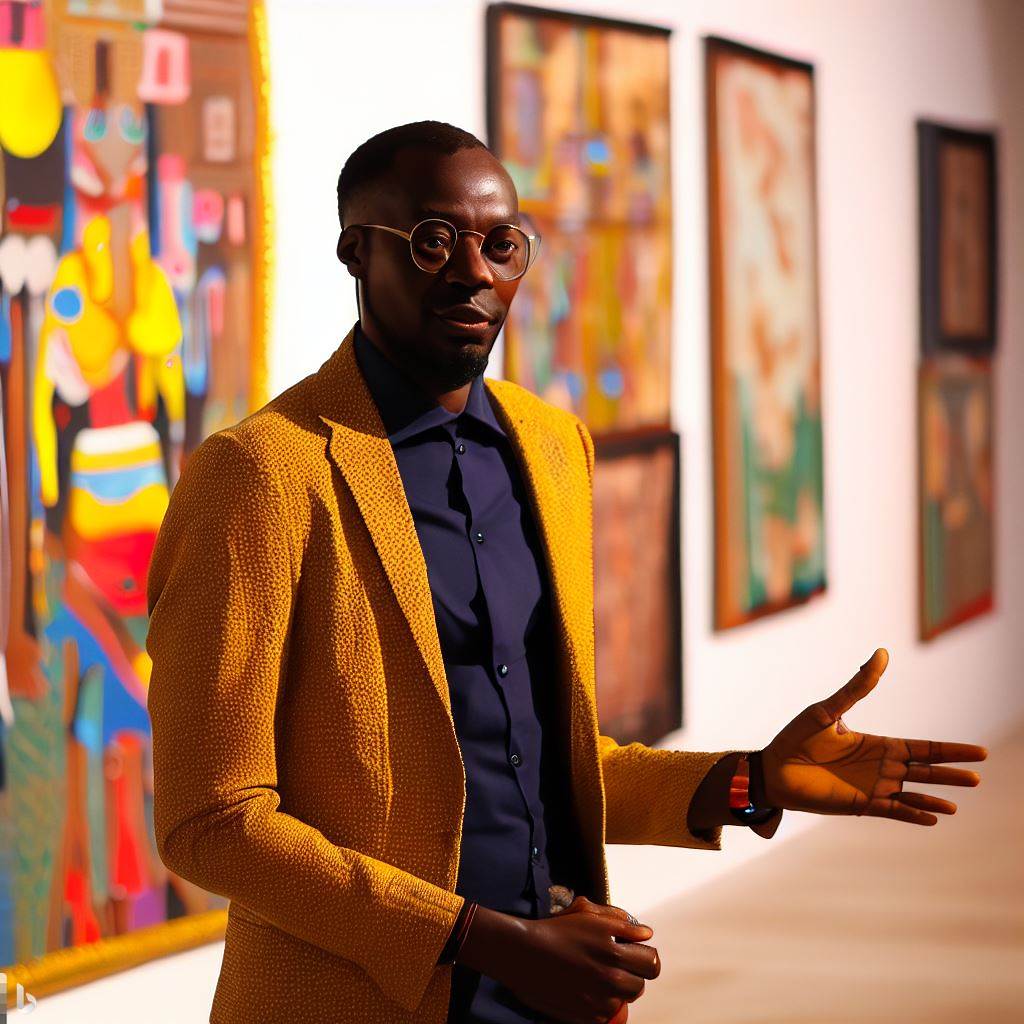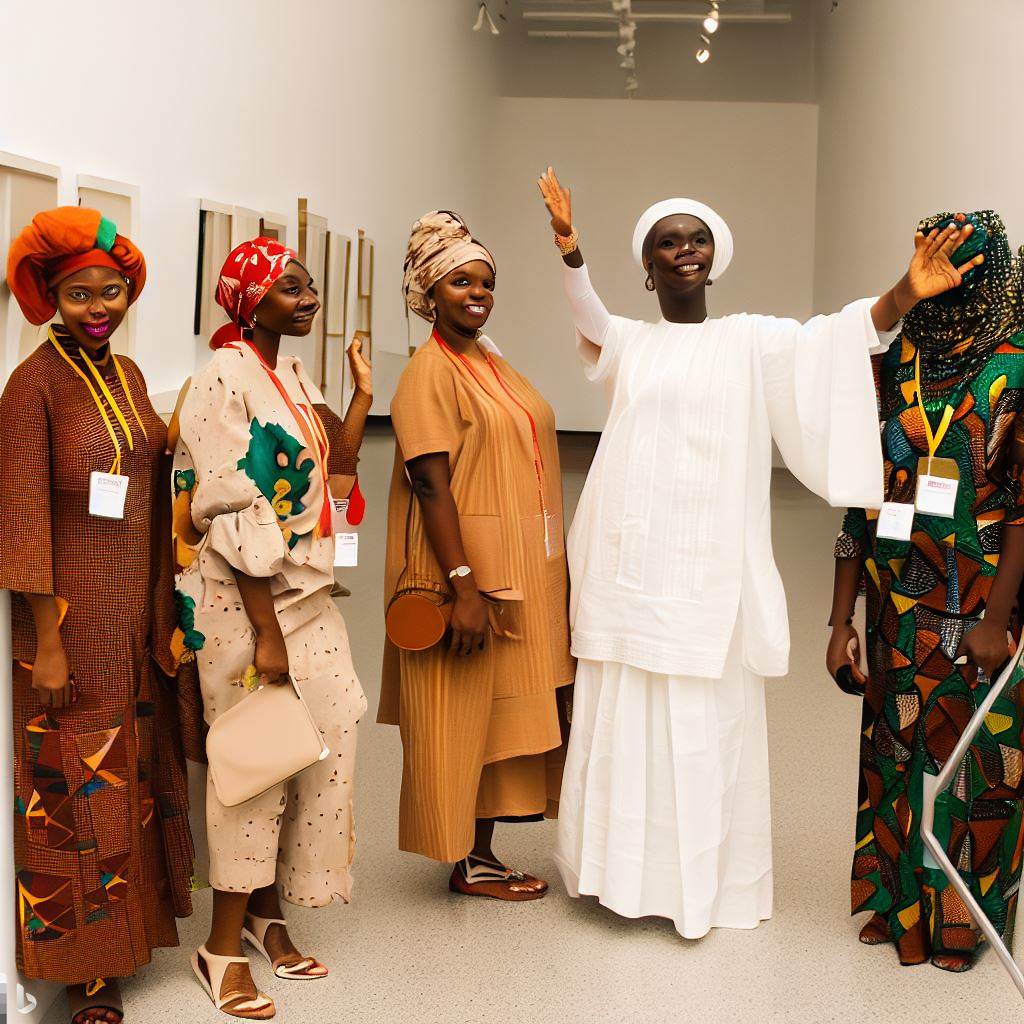Introduction
Brief overview of Nigeria’s growing art scene
In Nigeria, the art scene has been flourishing, witnessing unprecedented growth and recognition in recent times for Curators Role in Nigeria Art Scene
Various factors, including increased cultural institution investments, global African art interest, and local/international influence of Nigerian artists, drive this surge in arts appreciation.
Within this vibrant art scene, curators have emerged as influential figures who play a vital role in shaping and showcasing Nigeria’s artistic talent.
These curators are responsible for bringing together artists, artworks, and audiences, acting as the link between creators and the public.
Explanation of the role of curators in the art world
Curators in Nigeria curate exhibitions and art events that provide platforms for artists to showcase their work,
connect with potential buyers, and gain exposure. They carefully select the artworks, ensuring a balance of themes, styles, and artists, creating a coherent and engaging narrative within the exhibition space.
Furthermore, curators play a key role in preserving and promoting Nigeria’s artistic heritage.
They collaborate with artists, collectors, and institutions to curate exhibitions that explore the rich cultural history of the country, showcasing traditional and contemporary Nigerian art.
In addition to organizing exhibitions, curators also engage in research, critical analysis, and documentation of artworks.
They contribute to the discourse surrounding art by writing catalog essays, organizing panel discussions, and curating educational programs.
curators play an indispensable part in Nigeria’s growing art scene.
They contribute to the development of the arts by facilitating artistic exchanges, preserving cultural heritage, and creating meaningful experiences for both artists and audiences.
Their role is pivotal in ensuring the continued growth and recognition of Nigerian art on a global scale.
Historical Background of Art in Nigeria
Overview of traditional Nigerian art
- Traditional Nigerian art dates back thousands of years and is deeply rooted in cultural and spiritual practices.
- It includes a wide range of artistic forms such as sculpture, pottery, textiles, and masquerade performances.
- Traditional Nigerian art is often characterized by its symbolic representations, vibrant colors, and intricate designs.
- These art forms have been passed down through generations and play a significant role in preserving cultural heritage.
Influence of colonialism and modernization on Nigerian art
- During the colonial period, Nigerian art experienced a significant shift as Western influence started to infiltrate the country.
- Colonial rulers introduced European artistic styles and materials, leading to the fusion of traditional and Western art forms.
- Modernization also impacted Nigerian art, with artists exploring new techniques and materials influenced by global artistic trends.
- However, some argue that this period also led to the neglect and devaluation of traditional Nigerian art practices.
Emergence of contemporary Nigerian art
- In the post-independence era, Nigerian artists began to assert their identity and reclaim their artistic heritage.
- They focused on creating artworks that addressed social, political, and cultural issues affecting the country.
- Contemporary Nigerian artists have gained international recognition for their unique perspectives and contributions to the global art scene.
- Curators play a crucial role in promoting and showcasing contemporary Nigerian art both locally and internationally.
Curators act as intermediaries between artists and audiences, curating exhibitions, organizing art events, and building art collections.
They have the responsibility of selecting artworks that reflect the diversity and talent within the Nigerian art scene.
Curators also engage in research, scholarship, and documentation of Nigerian art, contributing to its preservation and dissemination.
Through their work, curators provide platforms for artists to showcase their works, gain exposure, and connect with the art community.
Curators collaborate with artists, galleries, and institutions to promote Nigerian art through local and international partnerships.
In recent years, curators have played a crucial role in highlighting the contributions of Nigerian women artists to the art scene.
They have curated exhibitions and organized events that challenge gender disparities and elevate the voices of women artists.
Curators also contribute to art education by organizing workshops, artist talks, and panel discussions.
By doing so, they enrich the understanding and appreciation of Nigerian art among both local and international audiences.
The role of curators in Nigeria’s growing art scene is essential for the development and recognition of Nigerian artists.
Through their expertise and dedication, curators contribute to the growth and sustainability of the Nigerian art industry.
They create opportunities for artists to thrive, inspire audiences, and shape the cultural identity of Nigeria.
Definition and responsibilities of curators
A curator is a professional responsible for the management and presentation of artworks and exhibitions.
Explanation of the role of curators in the art scene:
- Curators play a crucial role in organizing and showcasing artworks to the public.
- They ensure that the art scene remains vibrant and relevant.
- Curators select and interpret artworks to create meaningful and engaging exhibitions.
- They curate collections and develop themes to provide a cohesive artistic experience.
- Curators collaborate with artists, collectors, and galleries to showcase their works.
The Curators as art experts and tastemakers
- Curators possess extensive knowledge about different artistic movements, styles, and techniques.
- They have a keen eye for identifying exceptional artworks and emerging talents.
- Curators determine what artworks are worthy of recognition and contribute to the art’s cultural value.
- They shape trends and influence public opinion about contemporary art.
- Curators define artistic standards and guide the growth of the art scene.
Curators as cultivators of artistic talent
- Curators support and promote artists by giving them opportunities to showcase their works.
- They provide platforms for artists to gain exposure and reach a wider audience.
- Curators foster collaborations between artists and institutions, fostering creativity and innovation.
- They offer guidance and mentorship to emerging artists, aiding their professional development.
- Curators play a vital role in nurturing talent and cultivating a thriving artistic community.
Curators are essential figures in Nigeria’s growing art scene. They shape the artistic landscape by organizing exhibitions, selecting remarkable artworks, and influencing public opinion.
Curators also act as facilitators, supporting and promoting artists, providing platforms for exposure, and fostering collaboration in Curators Role in Nigeria Art Scene
Their expertise and dedication contribute to the growth and development of the Nigerian art scene.
Read: Digital Curation in Nigeria: A Modern Take on Tradition
The impact of curators on Nigeria’s art scene
Curators as facilitators of art exhibitions
- They play a crucial role in organizing and curating art exhibitions in Nigeria.
- Curators carefully select artworks to create a cohesive and meaningful exhibition.
- They collaborate with artists to showcase their work in the best possible way.
- Curators arrange the layout of artworks, ensuring a visually engaging and immersive experience.
- They consider the placement and lighting of each artwork to enhance its impact on viewers.
- Curators also create informative labels and catalogs to provide context and understanding for visitors.
- Their expertise and guidance contribute to the overall success of art exhibitions in Nigeria.
Curators as cultural ambassadors
- Curators act as ambassadors for Nigerian art by promoting its rich cultural heritage.
- They educate the public about Nigerian history, traditions, and artistic practices.
- Curators bridge the gap between artists and audiences, facilitating cultural exchange.
- They engage in conversations about the significance and relevance of Nigerian art.
- Curators organize talks, workshops, and panel discussions to foster dialogue and understanding.
- Through their work, curators elevate Nigerian art as a valuable and respected part of global culture.
- Curators represent Nigeria at international art events, showcasing its artistic diversity.
Promoting Nigerian art globally
- Curators actively promote Nigerian art on an international scale, exposing it to a global audience.
- They collaborate with international institutions and curators to showcase Nigerian artists and artworks.
- Curators create opportunities for Nigerian artists to exhibit their work abroad, expanding their reach.
- They curate Nigerian art exhibitions in prestigious galleries and museums around the world.
- Curators connect Nigerian artists with international collectors, curators, and art enthusiasts.
- Through collaborations, curators facilitate cultural exchange and foster artistic growth.
- Curators contribute to the global recognition and appreciation of Nigerian art Curators Role in Nigeria Art Scene
Curators have a significant impact on Nigeria’s art scene. As facilitators of art exhibitions, they curate and organize showcases that engage and educate audiences.
As cultural ambassadors, they promote Nigerian art and bridge the gap between artists and the public.
Additionally, curators play a crucial role in promoting Nigerian art globally, connecting artists with international opportunities and expanding the reach of their work.
The role of curators in Nigeria’s growing art scene cannot be underestimated as they contribute to the development and recognition of Nigerian art both locally and internationally.
Read: Skills Needed to Thrive as a Curator in Nigeria
Challenges faced by curators in Nigeria
Limited infrastructure and resources
- Curators in Nigeria often struggle with limited infrastructure for their exhibitions.
- The lack of proper gallery spaces and facilities makes it challenging to curate and display artwork.
- Curators may have to make do with unconventional venues or makeshift exhibition spaces.
- The absence of storage facilities also poses a challenge for curators to preserve and maintain artwork.
- Logistical difficulties in transporting artworks to and from exhibition venues further add to the challenges.
Financial constraints and lack of funding for exhibitions
- Curators face significant financial constraints when organizing exhibitions in Nigeria.
- The cost of renting venues, transporting artwork, and promoting exhibitions can be prohibitive.
- Securing sponsorship or funding for exhibitions is a major challenge for most curators.
- The limited government support for the arts in Nigeria makes it difficult to obtain financial assistance.
- Curators often have to rely on personal savings or seek partnerships with private sponsors.
Balancing traditional and contemporary art
- Curators in Nigeria are faced with the task of balancing traditional and contemporary art in their exhibitions.
- Preserving the rich cultural heritage while embracing new artistic expressions presents a unique challenge.
- Curators must carefully curate exhibitions that showcase both traditional and contemporary artworks.
- Negotiating the tension between preserving cultural authenticity and promoting artistic innovation is crucial.
- Curators also need to ensure that traditional artists have opportunities to exhibit alongside their contemporary counterparts.
curators in Nigeria face various challenges in their efforts to contribute to the growing art scene for Curators Role in Nigeria Art Scene
Limited infrastructure and resources, financial constraints, and the balancing act between traditional and contemporary art all pose significant challenges.
However, despite these obstacles, curators continue to play a crucial role in promoting Nigerian art and nurturing the talents of local artists.
With increased support from both the government and private sector, curators can overcome these challenges and further enrich the vibrant art scene in Nigeria.
Read: Challenges Faced by Curators in Nigeria’s Museums

Success stories of Nigerian curators
Examination of prominent curators and their achievements
Nigerian art scene has witnessed the emergence of several influential curators.
- One such curator is Bisi Silva, founder of the Centre for Contemporary Art (CCA) in Lagos.
- Silva has curated numerous exhibitions, both in Nigeria and internationally, showcasing the works of Nigerian artists.
- Another prominent curator is Okwui Enwezor, who curated the prestigious Venice Biennale in 2015.
- Enwezor’s contribution to the global recognition of Nigerian art cannot be overstated.
- Other successful curators include Chika Okeke-Agulu, curator of the Nigerian Pavilion at the 2015 Venice Biennale, and Ugochukwu-Smooth Nzewi, curator at the Museum of Contemporary Art, Cleveland.
- These curators have brought Nigerian art to the forefront of the international art scene.
Contribution to the growth of Nigerian art
Nigeria curators have played a crucial role in the development of the country’s art scene
- They have provided a platform for Nigerian artists to showcase their works and gain recognition.
- By curating exhibitions and organizing art events, curators have created opportunities for artists to network and collaborate.
- Curators have also educated the public about Nigerian art, both within the country and abroad.
- Through their efforts, Nigerian art has gained visibility and appreciation globally.
- Curators have also been instrumental in preserving and documenting the history of Nigerian art.
- They have curated retrospectives and archival exhibitions, ensuring that the legacy of Nigerian artists is not forgotten.
- Furthermore, curators have fostered dialogue and critical discourse around Nigerian art.
- Through panel discussions, lectures, and workshops, they have encouraged intellectual engagement with the artworks.
- Nigerian curators have also curated exhibitions that challenge societal norms and address social issues.
- They have used art as a form of activism and advocacy, shedding light on important topics such as gender equality, corruption, and political unrest.
Read: Nigeria’s Curator Job Market: Trends and Opportunities
Future prospects and outlook for curators in Nigeria’s art scene
Opportunities for curators to innovate and experiment
- With Nigeria’s growing art scene, curators have ample opportunities to explore new artistic concepts.
- They can push boundaries, challenge traditional norms, and experiment with different curating techniques.
- This innovation can lead to the discovery of fresh and unique talents within the Nigerian art community.
- Curators can also introduce unconventional exhibition formats and engage audiences in interactive ways.
- By embracing innovation, curators can make significant contributions to the development and evolution of Nigerian art.
Role of technology in enhancing curating practices
- Technology plays a vital role in revolutionizing curating practices in Nigeria’s art scene.
- Curators can leverage digital platforms to reach a wider audience and showcase artworks virtually.
- They can create immersive online exhibitions and collaborate with artists from different parts of the world.
- Virtual reality and augmented reality can be used to enhance visitors’ experience and provide interactive elements.
- 5The use of technology can also facilitate research, collection management, and preservation of art pieces.
Collaboration with international curators and art institutions
- Collaboration with international curators and art institutions can open doors to new possibilities for Nigerian curators.
- This exchange of ideas and experiences can enrich curatorial practices and bring global perspectives to Nigeria’s art scene.
- International collaborations can lead to joint exhibitions, workshops, and cultural exchanges.
- Nigerian curators can learn from the expertise of their international counterparts and gain exposure to diverse art practices.
- These collaborations also create opportunities for Nigerian artists to showcase their works on an international stage.
The future prospects for curators in Nigeria’s art scene are promising for Curators Role in Nigeria Art Scene
There are numerous opportunities for curators to innovate, experiment, and push artistic boundaries.
Technology can greatly enhance curating practices, allowing for virtual exhibitions and interactive experiences.
Collaborations with international curators and institutions can also broaden the horizons for Nigerian curators and artists.
As Nigeria’s art scene continues to grow, curators play a crucial role in shaping its evolution and contributing to its global recognition.
Conclusion
Recap of the significance of curators in Nigeria’s growing art scene
Curators play a significant role in Nigeria’s growing art scene by promoting artists and preserving cultural heritage.
Encouragement for further exploration and support of curators
It is crucial to encourage further exploration and support for curators to enhance the art scene in Nigeria.
- Significance: Curators play a pivotal role in shaping Nigeria’s vibrant art landscape.
- Interpreters: They bring meaning and context to diverse artistic expressions.
- Promoters: Curators expose Nigerian artists to global audiences, fostering recognition and sales.
- Preservation: They safeguard cultural heritage by curating exhibitions and collections.
- Educators: Curators educate the public about Nigeria’s rich art history.
- Innovation: They push boundaries, encouraging artists to experiment and evolve.
- Trendsetters: Curators influence art trends, guiding the evolution of the Nigerian art scene.
- Encouragement: Supporting curators means supporting Nigeria’s artistic growth.
- Engagement: Attend exhibitions, follow curators’ work, and collect Nigerian art.
- Collaboration: Foster partnerships to promote and preserve Nigeria’s artistic heritage.
As we celebrate curators’ vital roles, let’s continue to explore, appreciate, and champion their contributions to Nigeria’s dynamic art world.




